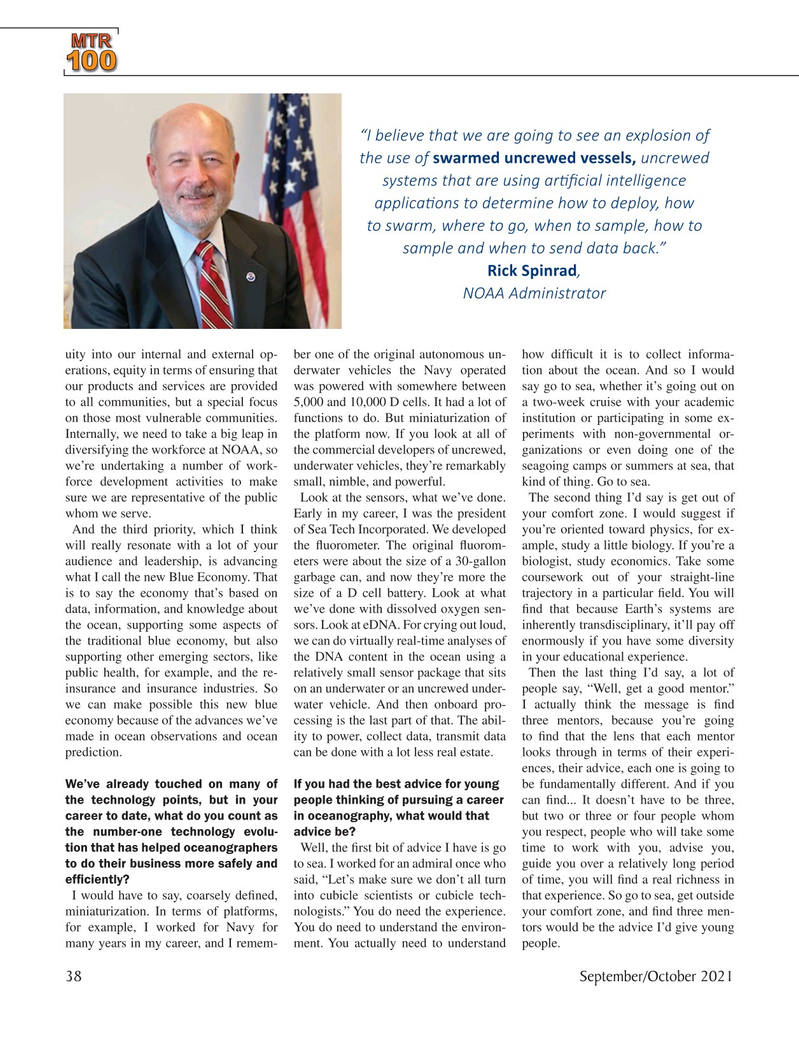
Page 38: of Marine Technology Magazine (September 2021)
MTR100: Focus on 100 Leading Companies, People and Innovations in the Subsea Space
Read this page in Pdf, Flash or Html5 edition of September 2021 Marine Technology Magazine
MTTTTTTTTTTTTTRM M M M M M M M M M M M M M M M M M M M M M M M M M M M MTRRRRRRRRRRRRRRRRRRRRRRRRRRRMTTTTTTTTTTTTTRMTR 100000000000000001111111111111111111111111111100000000000000000000000000000010000000000000000100 “I believe that we are going to see an explosion of the use of swarmed uncrewed vessels, uncrewed systems that are using arO ? cial intelligence applicaO ons to determine how to deploy, how to swarm, where to go, when to sample, how to sample and when to send data back.”
Rick Spinrad,
NOAA Administrator uity into our internal and external op- ber one of the original autonomous un- how dif? cult it is to collect informa- erations, equity in terms of ensuring that derwater vehicles the Navy operated tion about the ocean. And so I would our products and services are provided was powered with somewhere between say go to sea, whether it’s going out on to all communities, but a special focus 5,000 and 10,000 D cells. It had a lot of a two-week cruise with your academic on those most vulnerable communities. functions to do. But miniaturization of institution or participating in some ex-
Internally, we need to take a big leap in the platform now. If you look at all of periments with non-governmental or- diversifying the workforce at NOAA, so the commercial developers of uncrewed, ganizations or even doing one of the we’re undertaking a number of work- underwater vehicles, they’re remarkably seagoing camps or summers at sea, that force development activities to make small, nimble, and powerful. kind of thing. Go to sea.
sure we are representative of the public Look at the sensors, what we’ve done. The second thing I’d say is get out of whom we serve. Early in my career, I was the president your comfort zone. I would suggest if
And the third priority, which I think of Sea Tech Incorporated. We developed you’re oriented toward physics, for ex- will really resonate with a lot of your the ? uorometer. The original ? uorom- ample, study a little biology. If you’re a audience and leadership, is advancing eters were about the size of a 30-gallon biologist, study economics. Take some what I call the new Blue Economy. That garbage can, and now they’re more the coursework out of your straight-line is to say the economy that’s based on size of a D cell battery. Look at what trajectory in a particular ? eld. You will data, information, and knowledge about we’ve done with dissolved oxygen sen- ? nd that because Earth’s systems are the ocean, supporting some aspects of sors. Look at eDNA. For crying out loud, inherently transdisciplinary, it’ll pay off the traditional blue economy, but also we can do virtually real-time analyses of enormously if you have some diversity supporting other emerging sectors, like the DNA content in the ocean using a in your educational experience.
public health, for example, and the re- relatively small sensor package that sits Then the last thing I’d say, a lot of insurance and insurance industries. So on an underwater or an uncrewed under- people say, “Well, get a good mentor.” we can make possible this new blue water vehicle. And then onboard pro- I actually think the message is ? nd economy because of the advances we’ve cessing is the last part of that. The abil- three mentors, because you’re going made in ocean observations and ocean ity to power, collect data, transmit data to ? nd that the lens that each mentor prediction. can be done with a lot less real estate. looks through in terms of their experi- ences, their advice, each one is going to
We’ve already touched on many of If you had the best advice for young be fundamentally different. And if you the technology points, but in your people thinking of pursuing a career can ? nd... It doesn’t have to be three, career to date, what do you count as in oceanography, what would that but two or three or four people whom the number-one technology evolu- advice be? you respect, people who will take some tion that has helped oceanographers Well, the ? rst bit of advice I have is go time to work with you, advise you, to do their business more safely and to sea. I worked for an admiral once who guide you over a relatively long period ef? ciently? said, “Let’s make sure we don’t all turn of time, you will ? nd a real richness in
I would have to say, coarsely de? ned, into cubicle scientists or cubicle tech- that experience. So go to sea, get outside miniaturization. In terms of platforms, nologists.” You do need the experience. your comfort zone, and ? nd three men- for example, I worked for Navy for You do need to understand the environ- tors would be the advice I’d give young many years in my career, and I remem- ment. You actually need to understand people.
38 September/October 2021
MTR #7 (34-49).indd 38 9/22/2021 2:19:27 PM

 37
37

 39
39
